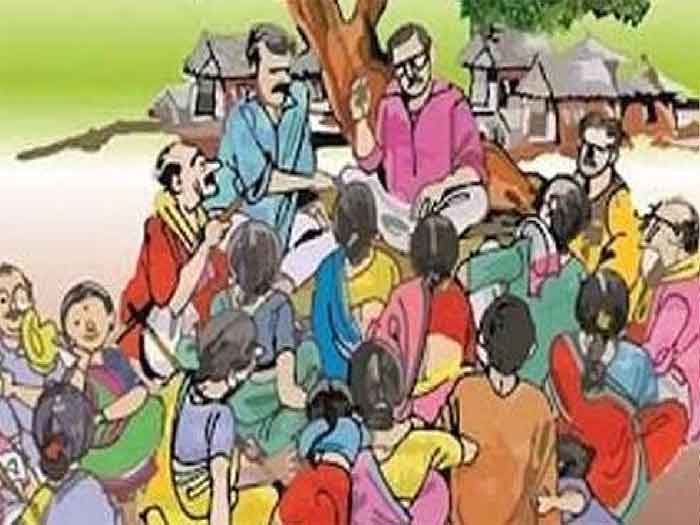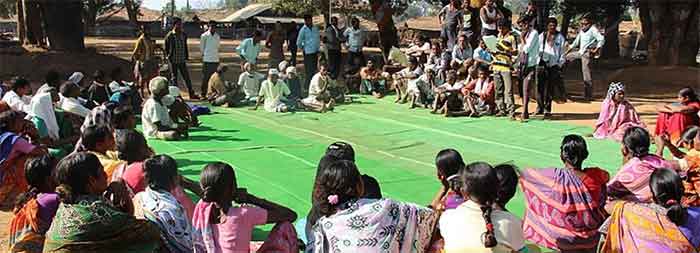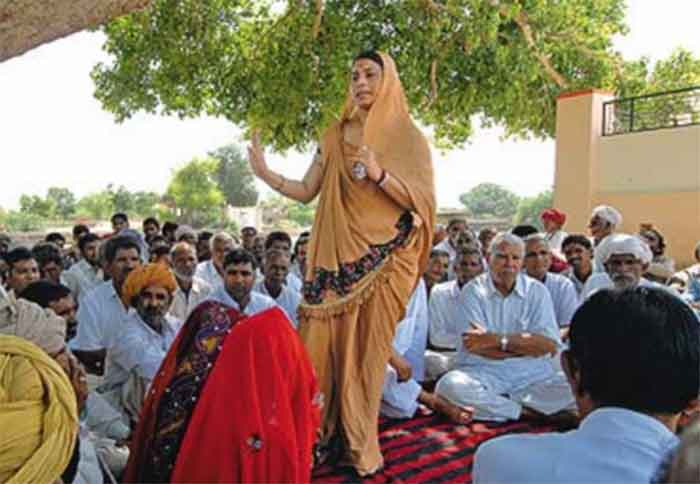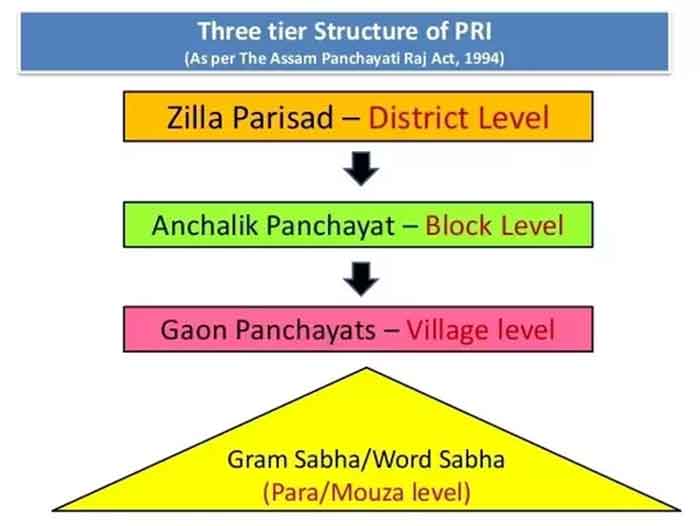
The upcoming panchayat election in Bihar is a good occasion to examine the broader issues faced by the Panchayati Raj Institution (“PRIs”) in Bihar. According to media reports, the State Election Commission of Bihar has started to prepare for the upcoming panchayat election in Bihar, and the poll process would commence from the end of August.[1] Preceded by a 23-year gap as large-scale violence marred the 1978 panchayat elections, the panchayat elections in Bihar have been held on a mandated five-year interval since 2001. However, apart from conducting the panchayat elections, the National Democratic Alliance (“NDA”) government in Bihar has done little to further participatory democracy as the idea of local self-government remains illusory even after about 1,27,391 representatives get elected after every five years.
Before we start analysing the issues faced by PRIs in Bihar, let us understand their structure. The PRIs in Bihar follows a three-tier structure: (i) gram panchayats at the village level; (ii) panchayat samitis at the block level; and (iii) zilla parishads at the district level. A directly elected mukhiya heads each gram panchayat who is responsible for convening the meeting of gram sabha at regular intervals. `The objective is to strengthen democratic participation and to implement and execute schemes to meet local needs. To further this objective, each gram panchayat is further divided into wards. In addition to the three-tier structure, a gram katchahry has also been established at each gram panchayat for dispensation of justice at the doorsteps of rural populace.
Proceeding to the issue, the core argument of the article is that there is no devolution of powers and responsibilities by the NDA government to the PRIs in Bihar. In the absence of actual devolution of power to the panchayat bodies, the elected local representatives remain mere agents to carry out the delegated functions of the state government. To start with, only 17 of the 29 functions of the Eleventh Schedule of the Constitution has been formally devolved to the PRIs in Bihar as per the report of the 15th Finance Commission. In reality, only six functions (drinking water, rural roads, non-conventional energy sources, poverty alleviation schemes, education, maintenance of community assets) are carried out by gram panchayats.[2] Even with respect to the aforementioned functions, the local representatives function as mere rubber-stamp for neither substantial responsibility/ discretion nor adequate fund[3] is given to them.
Based on my interactions with several Mukhiyas in five districts of Bihar[4], I found that the role of Mukhiya is limited to the sanctioning and supervision of the rigid schemes formulated by the top-level bureaucrats. Along with imposition of administrative conditions, there is a strict monetary limit on how the fund given to the gram panchayats is to be used for the respective schemes. It takes away the flexibility of the Mukhiyas to use the fund according to the local needs or exigencies in their area and limits the scope of any independent initiatives by them. Such concern was echoed by almost all the Mukhiyas who I had the chance to interview. Anil Jha, Mukhiya of Basauli gram panchayat, expressed his concern: “The order comes from above to do this or do that. No need in the area but we still have to do that. What we need, there is no fund for that. Public wants sewer but fund we get for that is two lakh rupees, let’s say. So how long the sewer we could make with 2 lakh budget? The work remains incomplete, and we have to wait for another year to get the fund. This is the issue.” Even when it comes to releasing funds to the beneficiaries of Indira Awas Yojanas, the Mukhiyas do not enjoy any discretion and are required to go serial-wise. Shravan Kumar, Mukhiya of Naili gram panchayat, told me that due to them going serial-wise they face a lot of bureaucratic hassles in releasing funds to someone who is in immediate need of money to build their house.
Moreover, the state government departments which transferred their functions to the PRIs continue to receive budgetary allocation with respect to the transferred functions and are largely in control of the implementation of the schemes. Furthermore, the 2020 CAG Audit Report notices that the parallel bodies such as District Education Mission and District Rural Development Agencies were also carrying the functions which are supposed to be carried out by the PRIs thereby undermining their autonomy. This is not devolution; this is delegation of power. For panchayats to actually function, the focus must shift from local representation to local government. As Balwant Rai Mehta Committee (1957) notes:
“The delegation of power is often mistaken for decentralisation. The former does not divest Government of the ultimate responsibility for the action of the authority to whom the power is delegated. This authority is under the control of Government and is in every way subordinate to it. Decentralisation, on the other hand, is a process whereby Government divests itself completely of certain duties and responsibilities and devolves them on some other authority.”
The second issue is with respect to mobilisation of own resources by the PRIs. No taxes are collected or levied by the PRIs in Bihar despite the recommendations of the 4th and 5th Bihar State Finance Commission as the Panchayat Raj Department have not framed any regulations for taxation. It is important to note that as per Bihar Panchayati Raj Act 2006, the PRIs may impose taxes on holdings, professions and levy tolls and fees. However, they are not able to do so as the Bihar government has not authorised to do the same. Due to the inability to raise their own finance, PRIs are virtually dependent on the Central and State government grants which often get delayed in reaching the panchayats.
Last but not the least, the PRIs in Bihar lack the support staff to perform even basic functions. Moreover, the staffs are hired by the state government departments and therefore, they remain answerable to them and are not willing to understand the concerns of the elected representatives. Sunil Kumar, Mukhiya of Paraiya gram panchayat, told me: “Mukhiyas don’t control the salary of the departmental staff such as Panchayat Sachiv and Junior Engineer. BDO Sahab pays the salary. Ideally, as per law, the Mukhiyas should be marking their attendance. However, we never got the attendance slip. So, the staffs get their attendance marked at the block office and then they never show their faces in our gram panchayat.” Coupled with unsupportive department staff, the Mukhiyas also suffer from lack of their own training when it comes to implementation of schemes. Rather than getting one-time ‘khanapurti’ training, they demand that they should be given scheme-based training so that they would be able to implement the schemes in a better fashion.
Everybody loves the idea of local self-government. However, when it comes to actual practice, what we have as panchayat is nothing but a front office of the state government tied down through straitjacketed finance and administrative restrictions, parallel bodies and department staff not answerable to the elected representatives.
[1] https://www.hindustantimes.com/cities/patna-news/sec-gears-to-advance-bihar-panchayat-poll-schedule-by-holding-election-from-august-101625314257654.html.
[2] Report No. 1 of the year 2020 of the Comptroller and Auditor General of India on General, Social and Economic Sectors for the year ended 31 March 2018 (Govt. of Bihar) (“2020 CAG Audit Report”).
[3] As per the Fifth State Finance Commission report, funds available to the PRIs were grossly inadequate for their assigned functions. This was acknowledged by the 2020 CAG Audit Report.
[4] Darbhanga, Gaya, Nalanda, Madhubani and Katihar are the districts. I chose random five mukhiyas from the districts mentioned above to understand their functions, power and the issues faced by them.
Mayank Labh is a graduate of NALSAR University of Law, Hyderabad












































